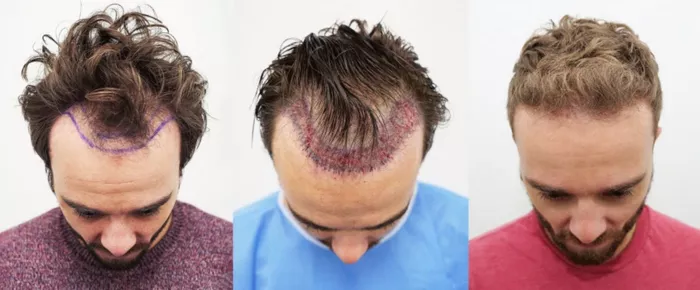Embarking on a journey toward hair restoration through a transplant is a significant decision, and individuals rightfully aspire to achieve lasting and natural-looking results. However, the success of a hair transplant is contingent on various factors, and being aware of potential pitfalls is crucial. In this article, we explore the elements that can compromise a hair transplant and hinder the desired outcome.
1. Inadequate Research and Choosing the Wrong Clinic
One of the primary factors that can jeopardize the success of a hair transplant is insufficient research and choosing the wrong clinic. The expertise and reputation of the surgeon, the clinic’s track record, and the available facilities all play pivotal roles. Opting for an inexperienced or unqualified surgeon, or selecting a clinic with a subpar reputation, increases the risk of poor results and potential complications. Thorough research, reviews, and consultations are imperative when selecting a clinic for a hair transplant.
2. Poor Candidate Assessment: Unrealistic Expectations
Not every individual is an ideal candidate for a hair transplant, and poor candidate assessment can lead to unrealistic expectations and unsatisfactory outcomes. A reputable surgeon will assess factors such as the individual’s age, overall health, donor hair availability, and expectations before recommending a hair transplant. Unrealistic expectations, such as expecting a full head of hair with a single procedure, can result in disappointment and compromise the overall satisfaction with the results.
3. Inadequate Donor Hair Management: Overharvesting
The success of a hair transplant relies heavily on the management of donor hair. Overharvesting, or extracting too many grafts from the donor area, can lead to thinning or an unnatural appearance in the donor region. A skilled surgeon will strike a balance between obtaining an adequate number of grafts for transplantation and preserving the natural density and aesthetics of the donor area. Careful planning and execution are essential to prevent overharvesting and ensure a harmonious outcome.
4. Poor Graft Handling: Transection and Damage
The handling of grafts during the transplantation process is a critical factor that can influence the success of the procedure. Graft transection, which occurs when the grafts are cut or damaged during extraction, can compromise their viability. A surgeon’s experience, precision, and the use of advanced tools contribute to minimizing graft damage. Proper graft handling is vital to achieving optimal growth and a natural appearance in the recipient area.
5. Inadequate Planning and Design: Unnatural Results
Artistry plays a significant role in the success of a hair transplant. Inadequate planning and design can result in unnatural-looking results that do not complement the individual’s facial features. A skilled surgeon will consider factors such as hairline design, hair direction, and overall aesthetic balance to create a result that appears natural and harmonious. Insufficient attention to these details can lead to dissatisfaction with the final outcome.
6. Failure to Address Underlying Hair Loss Factors
A successful hair transplant involves not only addressing the visible effects of hair loss but also understanding and managing the underlying factors contributing to hair loss. Failure to identify and address these factors, which may include hormonal imbalances, nutritional deficiencies, or other medical conditions, can compromise the long-term success of the transplant. A comprehensive approach to hair restoration considers both the immediate aesthetic goals and the ongoing management of hair health.
7. Poor Post-Operative Care: Compromising Recovery
The post-operative period is crucial for the success of a hair transplant. Poor post-operative care, including neglecting to follow care instructions, exposing the transplanted area to harsh conditions, or using improper hair care products, can compromise the recovery process. Patients must adhere to the post-operative care guidelines provided by their surgeon to promote optimal healing and ensure the long-term success of the transplant.
8. Medical Complications: Infections and Other Risks
While hair transplants are generally safe, like any surgical procedure, there is a risk of complications. Infections, although rare, can occur if proper hygiene practices are not followed. It is essential for patients to follow the prescribed care routines, including keeping the transplanted area clean and avoiding activities that may expose it to potential contaminants. Adhering to post-operative instructions minimizes the risk of complications and contributes to a successful recovery.
9. Rushed Recovery: Impatience with Results
Patience is a virtue in the realm of hair transplants. Rushed expectations and impatience with the results can lead to dissatisfaction. Hair growth following a transplant takes time, and individuals must understand that visible results may not be immediate. Surgeons typically provide a timeline for when results can be expected, and patients should adhere to this schedule without undue impatience or frustration.
10. Neglecting Follow-Up: Monitoring and Maintenance
After the initial recovery period, neglecting follow-up appointments and long-term monitoring can compromise the sustained success of a hair transplant. Regular follow-up visits allow the surgeon to assess the progress of hair growth, address any concerns, and provide additional guidance on hair care and maintenance. Ongoing communication with the surgeon ensures that any emerging issues are addressed promptly, contributing to the long-term success of the transplant.
See Also: [Revealed!] Can You Wear A Beanie After Hair Transplant?
Conclusion: A Holistic Approach to Successful Hair Transplants
Achieving a successful hair transplant involves more than just the technical aspects of the procedure. A holistic approach, encompassing thorough research, careful planning, proper execution, and vigilant post-operative care, is essential. Identifying and addressing potential pitfalls, from candidate assessment to long-term monitoring, contributes to a positive and satisfying hair transplant experience. By partnering with a qualified and reputable surgeon and committing to a comprehensive approach, individuals can enhance the likelihood of achieving natural-looking and lasting results in their journey toward hair restoration.


